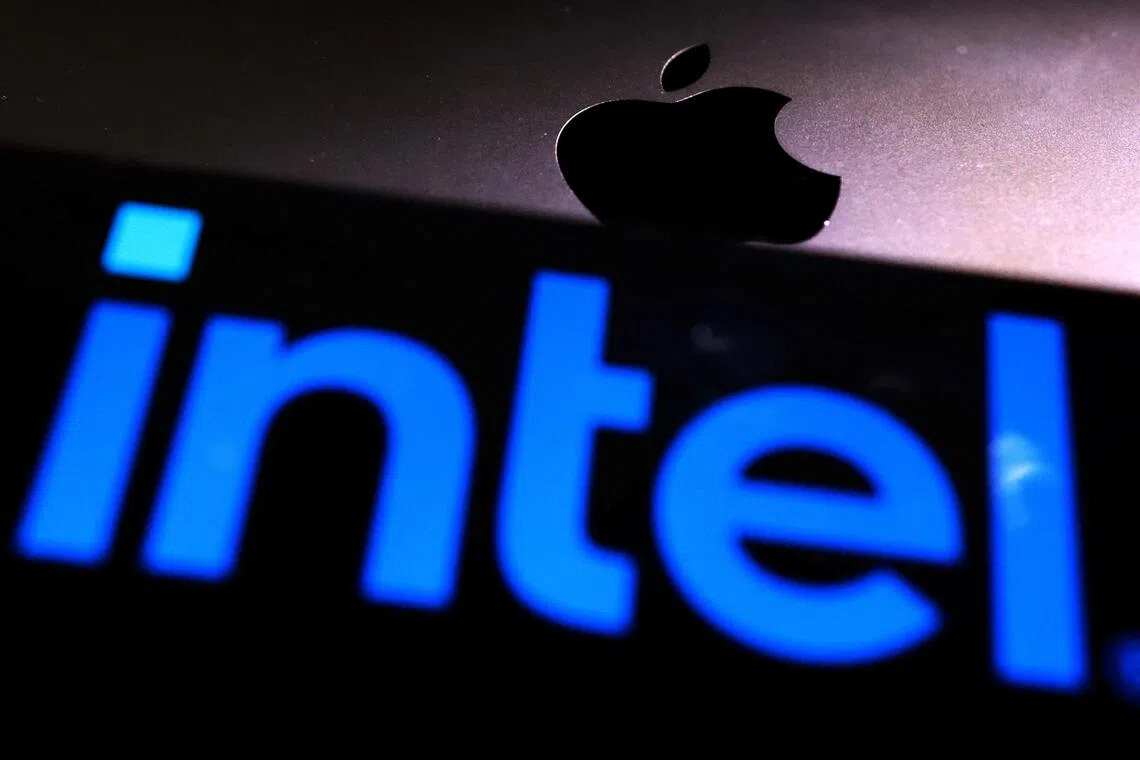Intel seeking investment from Apple as part of comeback bid, sources say
Sign up now: Get ST's newsletters delivered to your inbox

Such a deal would follow a US$5 billion investment last week by Nvidia, which plans to work with Intel on chips for personal computers and data centres.
PHOTO: REUTERS
- Intel is seeking investment from Apple to bolster its turnaround efforts amidst struggles in the AI chip market.
- Apple may diversify its chip supply chain away from TSMC and improve US relations via this potential partnership.
- Intel is actively pursuing partnerships after investments from Nvidia, the US government and SoftBank to boost its future.
AI generated
NEW YORK - Intel has approached Apple about securing an investment in the ailing chipmaker, according to sources familiar with the matter, part of efforts to bolster a business that is now partially owned by the US government.
Apple and Intel have also discussed how to work more closely together, said the people.
The talks had been in an early stage and may not lead to an agreement, they said.
Shares of Intel jumped 6.4 per cent to US$31.22 on Sept 24 in New York after Bloomberg News reported on the discussions. Apple closed down less than 1 per cent at US$252.31.
Such a deal would follow a US$5 billion (S$6.4 billion) investment last week by Nvidia
SoftBank Group, the Japanese tech giant seeking to expand further in the US, announced a US$2 billion investment in Intel in August.
Intel has also reached out to other companies about possible investments and partnerships, the sources said.
A deal with Apple, a long-time Intel customer that switched to in-house processors in the past five years, would represent further validation of the chipmaker’s turnaround bid.
Still, it is unlikely that Apple would switch back to Intel processors in its devices. The iPhone maker’s most sophisticated chips are now produced by partner Taiwan Semiconductor Manufacturing Co.
Intel chief executive Tan Lip-Bu is attempting a comeback with the backing of the US government. In an unconventional deal brokered by the Trump administration in August, the US acquired a roughly 10 per cent stake in the chipmaker
Even with financial support, Intel’s challenges remain daunting. The company has lost its long-held technological edge and ceded market share to rivals such as Advanced Micro Devices.
Moreover, Intel has struggled to capitalise on booming sales of artificial intelligence gear – a speciality of Nvidia.
Once the dominant chipmaker, Intel now has a fraction of Nvidia’s sales and market capitalisation. It has laid off workers and delayed factory expansion plans to cope with its deteriorating finances.
Still, investors have grown more optimistic about its prospects since the government infusion. The stock has risen more than 60 per cent since the beginning of August.
Under former chief executive Pat Gelsinger, Intel set out to become a chip foundry – a business that makes semiconductors for outside clients. But the company has struggled to secure enough customers to support its factory expansion plans.
Intel has continued to pursue the foundry strategy under Mr Tan, though more cautiously. He said in July that Intel would roll out a new cutting-edge production technique – called 14A – only if customers committed to it.
Apple and Intel have a long, sometimes strained history together. Apple used Intel chips in its Macs for years but began shifting away from the supplier in 2020 – part of a broader effort to use more in-house components. Apple also acquired most of Intel’s modem chip business in 2019.
These days, Apple has sought to show that it is investing heavily in the US – even as much of its production remains overseas.
At a White House event in August, the firm announced plans to spend US$600 billion on domestic initiatives over a four-year period, up from a previous pledge of US$500 billion. The centrepiece of the expansion was a US$2.5 billion investment in Corning, Apple’s long-time glass supplier.
Apple chief executive Tim Cook told CNBC host Jim Cramer that the investments would encourage other companies to add US production, creating a “domino effect”.
When asked about Intel, he said competition would be good for the chip foundry industry. “We’d love to see Intel come back,” Mr Cook said. BLOOMBERG


